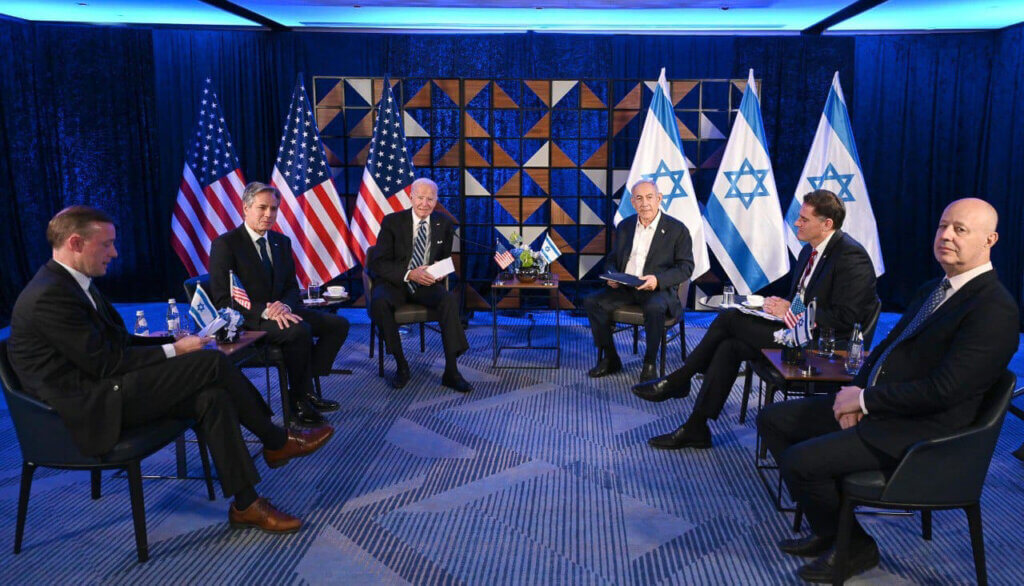Irrespective of the war’s result, the series of events in Gaza has completely disrupted the foundations of the U.S.-Israeli strategic relationship. Whereas the United States and Israel were on the verge of consolidating their vision for the region through the Abraham Accords, Hamas’s October 7 attack dealt it a serious blow. Now, instead of having finalized that project, it is making the U.S. appear foolish in the eyes of the region, where its continued support for Israel has sparked renewed tensions in the Arab world and strained its systems of alliance in the region. Whereas the U.S. once appeared free — despite its attempts to promote its regional alliance through normalization without solving the Palestinian issue while enhancing its soft power and shifting its strategic and military focus to Asia — the U.S. now runs the risk of getting bogged down in a quagmire that can reshape U.S. relations throughout the region. And this includes Israel.
Cultural, electoral, and various other factors have historically shaped the debate within America’s foreign policy establishment concerning Israel’s value as a strategic asset. Among the various arguments, the most salient is Israel’s military and political prowess as a counterbalance to any emerging regional powerhouse or potential regional government. The nation’s consistent military successes in conflicts with multiple Arab states in its early days further bolstered its reputation as a formidable strategic actor, underscoring the benefits of its partnership with America in the region. In the Cold War, Israel’s alignment with the U.S. and its counterweight to Soviet influence reinforced this view. It is important here to point out that Israel’s military performance was central to the growing support it garnered from the American foreign policy establishment and to the prevailing view that it provides American power with a stable ally that enjoys strong military and deterrent capacities.
The events of October 7 have thrown this view into disarray.
Other than shattering the image of Israeli military invincibility, the fallout from October 7 and Israel’s subsequent genocidal war on Gaza has enabled players like Russia and China to point out the moral and political double standards in America’s posture in the region and to present their political and moral position as more amenable to both sides of the conflict.
More importantly, Israel’s military and intelligence apparatus has gradually grown weaker and more dependent on American power and is highly volatile and unpredictable in terms of defining clear strategic objectives in its current military campaign — occupying Gaza, ethnic cleansing, or bringing in a new security arrangement through the support of regional powers, or a limited military operation that would end up with renewed negotiations with Hamas. The myriad Israeli voices currently calling for a variety of forms of retribution — such as the use of weapons of mass destruction, proposals for an ethnic cleansing campaign, and the deliberate targeting of civilians, including children — is alienating some of America’s allies in the region. Those include actors like Jordan and Egypt, and they are adding to the increasing rise of a broad pro-ceasefire campaign that has globally embarrassed the U.S.
These events have already highlighted the extent to which Israel is increasingly becoming reliant on U.S. power. It summons U.S. military reinforcements, stretches an already overburdened American military-industrial complex, threatens a regional war that could have implications for the American system of alliances in the region, and places American soldiers in the line of fire. This is all happening while Israel maintains a “rejectionist” position toward the possibility of a political resolution of the conflict with the Palestinians.
Some individuals, like Dennis Ross in his recent NY Times article, strongly argue for giving Israel the necessary time and space to conduct its military operations in Gaza. There is a prevailing belief among some that Israel has the power to alter the situation in Gaza while also deterring Hezbollah and Iran with minimal or no retaliation, all while remaining committed to fighting and sacrificing its own soldiers in a war that could draw Israel and the U.S. into an even bigger quagmire.
Yet the complexity of the interests at stake says otherwise. Now that Israel’s deterrence has been fatally called into question, Israel’s posture, strength, and utility are also being increasingly called into question across the region. Even Ross’s argument that his friends in the Arab world want Israel to destroy Hamas is an attempt to argue that alliances in the region will not be impacted — which indicates concern that they will be. True, some in the region want Israel to “finish the job,” but they also don’t want Israel’s conduct to weaken or threaten their vital interests.
Unless America wants to deepen its involvement in the region, it will find itself in a regional storm that harms its economic recovery, lessens Biden’s chances to win the upcoming elections, and serves yet another American war in the Middle East.
The lobby’s naivety and American dissensus
October 7 not only revealed the faults in the U.S. grand strategy in the Middle East but also exposed the intellectual architecture that underlies it. This architecture was almost exclusively established, maintained, and propagated by the Israeli lobby.
The prevailing narrative frequently championed by the Israel lobby in Washington, with a few exceptions like J Street, asserts that the Palestinian issue is no longer as central as it once was. They maintain that the geopolitical dynamics of the region have shifted beyond the centrality of the Palestinian cause. This perspective seemed to gain traction, especially when one considers the rising concerns among Arab capitals regarding Iran’s influence in Iraq, Syria, Lebanon, Palestine, and Yemen. These capitals were eager for geopolitical and military powers that could serve as deterrents to Iran amidst American signaling that it has shifted its priority to the two most fundamental challenges to its hegemonic position: Russia and China.
The perceived weakness and lack of legitimacy of the Palestinian Authority, along with the region’s rising vulnerability to Iranian influence, compounded by Arab states’ apprehension about pan-Arab and Islamist movements, served as the backdrop for the Abraham Accords. Arab countries were also looking to leverage the lobby’s power in American domestic politics to acquire weapons and deepen their strategic alliances with the U.S. or Israel.
The Abraham Accords marked an important milestone in the effort to encourage regional American allies to publicly establish relations with Israel. Those in the region who had previously maintained secret connections now saw an opportunity to establish open diplomatic, economic, and military cooperation. The Abraham Accords took place following the civil wars of the Arab Spring, which had weakened opposition to normalization. Numerous Arab societies experienced severe setbacks — with their economies crumbling and a significant portion of their society displaced, Palestine was thrown by the wayside.
The lobby and its policies looked triumphant. The combined impact of Israel’s supporters convinced American elites and foreign policy experts that Palestine does not hinder U.S. interests in the region. This implies that the Arab world has moved past this issue or that it was never significant to begin with. It is worth noting that President Biden, who has shown strong support for Israel, has had limited to no involvement in the Israel-Palestine issue, and Palestinian interests have consistently been overlooked and considered to be manageable. October 7 is making everyone look foolish and even reckless, and Israel’s disproportionate and messianic discourse of vengeance is simply adding insult to injury.
At a time when Israel seeks the activation of the U.S.’s military protection as well as its political and diplomatic influence, the U.S. finds itself in a position to demonstrate globally that it stands by its allies. However, as the conflict persists, Israel and its domestic U.S. lobby face mounting pressure. As the underlying rationale and arguments used to justify the “special relationship” fade away, Israel will begin to reveal itself as a burden, and a costly one at that — because it chose to reject any political solution and instead chose military solutions that it couldn’t see through on its own.



I can honestly say that Israel has never looked weaker.
The fact that the US immediately felt the need to move two carrier strike groups (with third on its way) into the region, not just backs up my assessment but shows that the US thinks as much too.
The hype and myth surrounding Israel’s perceived leviathan-like military status was dealt a death blow on Oct 7. Their image as a military powerhouse utterly shattered. Despite Israel’s projection of force and unprecedented bombing run in Gaza, no amount of shooting fish in a barrel can change this. They can kill 90,000 innocent civilians if they choose, but you can bet your last shawarma that Iran, Lebanon, Egypt, Syria, and even Saudi Arabia are watching very closely as Israel, yet again, struggles and gets bogged down in the quagmire of Gaza.
The fact that the so-called greatest military in the region with a biblical Goliath-like quantitative military edge can get caught with its pants down, so easily overwhelmed, then spend a full month making very little progress against such a low tech and disadvantaged militia that wouldn’t even fill a college basketball arena, speaks volumes to Israel’s extreme vulnerability right now.
Literally the only thing protecting Israel from absolute catastrophe and existential crisis right now is the threat of the US looming over the region. If Hezbollah decided to enter the fray in a serious way the flood gates would open and I simply don’t think Israel would survive another 6 Day War situation if Lebanon, Syria, Iran and maybe Saudi Arabia combined forces. Not without full US intervention or Israel resorting to the unconscionable use of their nuclear weapons.
Not to mention, unlike in 1967, Israel now occupies the entire West Bank and 3.5 million Palestinians. If those Palestinians were to rise up while Israeli were engaged in a multi-front existential military war, and with 700,000 Israeli settlers embedded within their borders, Oct 7th would look like the opening act at open mic night at your local pub. And you can’t nuke your way out of that kind of situation.
Like every paper tiger bully, Israel might be confidently strutting over Gaza, talking a big game, and desperately trying to save face, while flexing its muscles at utterly defenseless women and children, but a can guarantee you that their Brother’s Keeper back in the US is in full freak out mode right about now.
I can’t say that I blame them either. Israel is over-extended on every front, strategically, financially, militarily, territorially, diplomatically, politically. It’s writing checks it absolutely cannot cash and it has run out of capital in terms of public opinion. The only one left to pick up the tab when the check bounces is America, and the American people sure as shit aren’t going to stand for another war in the Middle East just because the UpStart Nation can’t behave like a friggin’ grown up.
I can honestly say that Israel has never looked weaker.
Right or wrong, weak or strong, America’s first instinct is to do a rapid dash to fund, arm, and show unwavering support for Israel. This time no different from the past, but looking at the unprecedented brutality, and the casualty numbers, it is far WORSE. Think about it, we are supporting an apartheid nation that has slaughtered nearly 4000 little helpless children, in fact WE gave them the weapons to go on their killing spree. Israel’s brutality is make the Russians look better.
“More children have been killed in just over three weeks in Gaza than in all of the world’s conflicts combined in each of the past three years, according to the global charity Save the Children. For example, it said, 2,985 children were killed across two dozen war zones throughout all of last year.
“Gaza has become a graveyard for thousands of children,” said James Elder, a spokesperson for UNICEF, the U.N. children’s agency.
Images and footage of shell-shocked children being pulled from rubble in Gaza or writhing on dirty hospital gurneys have become commonplace and have fueled protests around the world“. AP
The endless bragging we have heard about what a strong leader Bibi was, what a brilliant military they have, and that they had the best Intelligence apparatus in the world, all turned out to be duds, they were all caught flat footed, and asleep at the wheel. Like it or not, it seems Hamas gave them a thrashing, they never expected. Hence the response going on in Gaza is vicious, brutal, and relentless….and as usual, it is the poor civilians, INCLUDING 4000 children, are paying the price for Netanyahu’s incompetence, and humiliation.
Massacring civilians taking refuge in UN shelters, churches, mosques, schools, hospitals, ambulances, refugees camps, and homes, does not seem to impress the rest of the world.
Blinken mentioned today that only Israel and America will not forget the terrible attack by Hamas, as the world seems to have been.
Maybe he knows the world sees the present situation through an entirely different lens – they are looking at it from 50 years ago, and see the entire pictures clearly. Whereas in the US the White House, Congress, and the media, show that this massacre going on, started only a few weeks ago.
As the UN chief said, it did not start in a vacuum, words that have him now having to deal with the zionist attack squads. They are so well organized.
“President Biden…. has had limited to no involvement in the Israel-Palestine issue, and Palestinian interests have consistently been overlooked…”
__________________________________________________________
Biden requested Abbas to end subsidies for acts that amounted to murder of innocent civilians. He may have concluded, when he was rejected, the insistence on “any means” meant he’d likely not be able to move diplomacy forward.